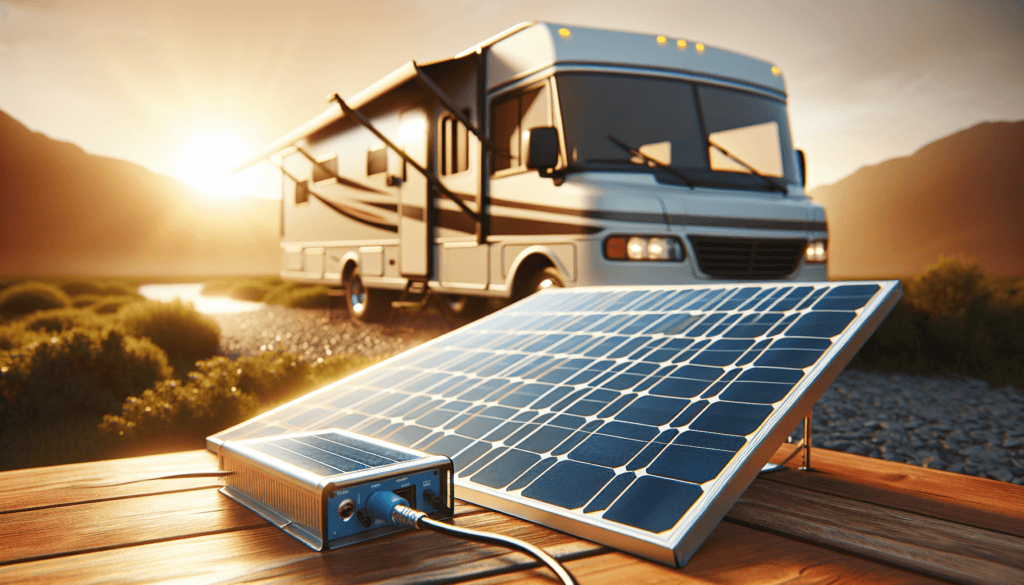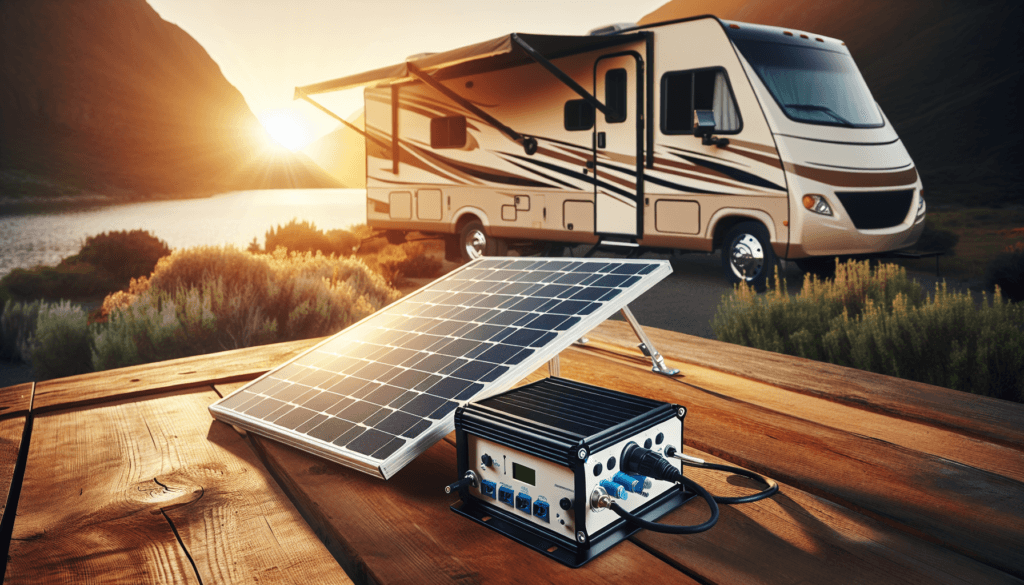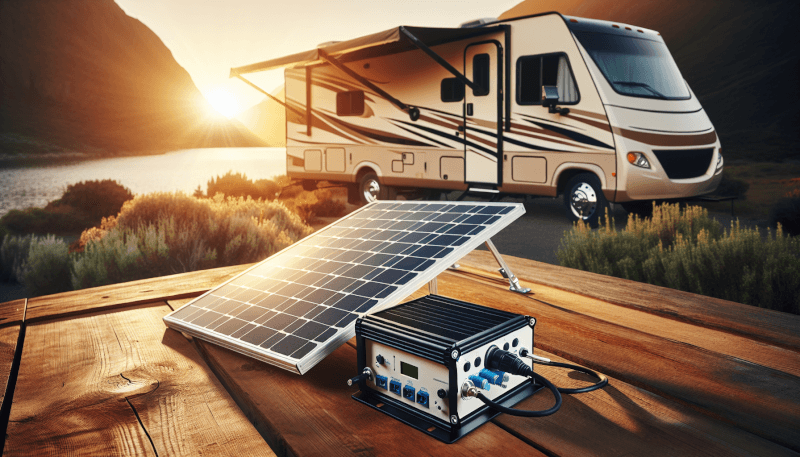Are you an avid RV camper looking to harness the power of the sun to enhance your camping experience? Look no further than the RV Camping Solar Controller. This innovative device is designed to regulate solar power for optimal efficiency in your RV, ensuring that you have a steady and reliable source of renewable energy on your adventures. Whether you’re charging your devices, running appliances, or simply enjoying the peace and quiet of nature, the RV Camping Solar Controller has got you covered. Say goodbye to relying solely on traditional power sources and embrace the freedom and sustainability that solar power brings to your RV camping experience.

What is a RV Camping Solar Controller?
Definition
A RV camping solar controller, also known as a solar charge controller, is an essential device that regulates the power generated by solar panels and charges the batteries of an RV camping solar system. It acts as a middleman between the solar panels and the batteries, ensuring that the energy produced by the panels is efficiently utilized and stored.
Importance
The RV camping solar controller plays a crucial role in the overall efficiency and performance of the solar system. It helps optimize the use of solar energy, prolongs the lifespan of the batteries, and protects the system from overcharging and overdischarging. Without a solar controller, the batteries could be damaged, and the entire RV camping experience could be compromised.
Components
A typical RV camping solar controller consists of several key components. These include:
Charge Controller: The main component of the solar controller, responsible for controlling the charging process and protecting the batteries.
Current Sensor: Monitors the flow of current between the solar panels, batteries, and load.
Voltage Regulator: Regulates the voltage from the solar panels to a level suitable for charging the batteries.
Display and Controls: Provides real-time information about the system’s performance and allows the user to adjust settings and parameters.
Connectors and Wiring: Enables the connection of the solar panels, batteries, and load to the controller.
How Does a RV Camping Solar Controller Work?
Basic Functionality
The RV camping solar controller works by intelligently managing the flow of electricity between the solar panels, batteries, and load. When sunlight hits the solar panels, they generate a direct current (DC) that needs to be converted and regulated before it can be used to charge the batteries. The solar controller achieves this by controlling the voltage and current, ensuring that the batteries receive the optimum amount of power.
Regulating Solar Power
One of the primary functions of the RV camping solar controller is to regulate the power generated by the solar panels. This involves adjusting the voltage and current to match the requirements of the batteries. The controller monitors the battery voltage and, based on predefined parameters, determines whether the batteries need to be charged, maintained, or disconnected from the solar panels.
Types of Solar Controllers
There are two main types of solar controllers available for RV camping solar systems: Pulse Width Modulation (PWM) and Maximum Power Point Tracking (MPPT).
PWM Controllers: PWM controllers are the most basic type of solar controllers. They regulate the charge flow by rapidly turning the power on and off to maintain a constant battery voltage. These controllers are suitable for smaller systems with lower voltage panels.
MPPT Controllers: MPPT controllers are more advanced and efficient than PWM controllers. They use complex algorithms to track and maximize the power output of the solar panels. MPPT controllers are capable of increasing the charging efficiency by up to 30% and are ideal for larger RV camping solar systems with higher voltage panels.
Benefits of Using a RV Camping Solar Controller
Optimizing Solar Energy
By regulating the power from the solar panels, the RV camping solar controller ensures that the maximum amount of energy is harvested and utilized. This optimization leads to increased efficiency and reduced reliance on external power sources, saving money and reducing environmental impact.
Extended Battery Life
The RV camping solar controller plays a crucial role in prolonging the lifespan of the batteries. By preventing overcharging and overdischarging, it safeguards the batteries from damage and premature failure. This ensures that the batteries can provide reliable power for longer periods, especially during extended camping trips.
Protection against Overcharging and Overdischarging
Overcharging and overdischarging are two common causes of battery degradation and failure. The RV camping solar controller actively monitors the battery voltage and takes appropriate actions to prevent these issues. It regulates the charging process, ensuring that the batteries receive the right amount of power without being subjected to excessive stress.
Efficient Power Management
The RV camping solar controller helps manage the distribution of power within the RV solar system. It ensures that the energy generated by the solar panels is first used to charge the batteries and then powers the various appliances and devices in the RV. This efficient management prevents power wastage and allows for a reliable and consistent power supply.
Choosing the Right RV Camping Solar Controller
Amperage and Voltage Compatibility
It is essential to consider the amperage and voltage compatibility of the RV camping solar controller with the solar panels and batteries. The controller should be able to handle the maximum current and voltage generated by the panels and provide the appropriate charging voltage for the batteries.
PWM vs. MPPT Controllers
Consider the type of controller that best suits the specific needs of your RV camping solar system. PWM controllers are more affordable and suitable for smaller systems, while MPPT controllers offer higher efficiency and are ideal for larger systems with higher voltage panels.
Battery Type Compatibility
Different types of batteries require different charging profiles. Ensure that the RV camping solar controller is compatible with the type of batteries you have installed in your RV. Common battery types include lead-acid, lithium-ion, and gel batteries.
Display and Monitoring Features
Look for an RV camping solar controller with a clear and informative display that provides real-time data on the system’s performance. Some controllers also offer additional monitoring features, such as historical data logging and remote monitoring capabilities.
Durability and Weather Resistance
Since RV camping involves exposure to various weather conditions, it is crucial to choose a solar controller that is durable and weather-resistant. Look for controllers with solid construction and waterproof features to ensure long-lasting performance.

Installation and Setup of a RV Camping Solar Controller
Determining Panel and Controller Placement
Start by determining the optimal location for mounting the solar panels on the RV roof or nearby surfaces. Ensure that they receive maximum sunlight exposure throughout the day. Then, find a suitable location inside the RV to mount the solar controller, preferably near the batteries and with easy access for monitoring and maintenance.
Wiring and Connection Guidelines
Follow the manufacturer’s guidelines for wiring and connecting the solar panels, batteries, and load to the RV camping solar controller. Use appropriate wire sizes and connectors to ensure efficient power transfer and minimize voltage drop. Double-check the polarity of the connections to avoid any damage to the system.
Setting System Parameters
Once the RV camping solar controller is connected, configure the system parameters according to your specific requirements. This may include setting the battery type, charging voltage, load control settings, and any other customizable parameters available on the controller.
Safety Precautions
During the installation process, always prioritize safety. Take necessary precautions to ensure that the system is properly grounded, and use appropriate safety equipment when working with electricity. It is also advisable to consult a professional electrician or experienced RV solar installer if you are unsure about any aspect of the installation.
Proper Maintenance of RV Camping Solar Controllers
Regular Inspection and Cleaning
Regularly inspect the solar panels, batteries, and connections to ensure they are clean and free from any debris or corrosion. Clean the panels as needed using a non-abrasive cloth or sponge and mild detergent. Inspect the wiring and connectors for any signs of wear or damage and replace them if necessary.
Performance Testing and Troubleshooting
Periodically test the performance of the RV camping solar system using a multimeter or a dedicated solar analyzer. Monitor the battery voltage, charging current, and power output of the solar panels to identify any performance issues. Troubleshoot and address any problems promptly to maintain optimal system efficiency.
Battery Maintenance
In addition to the solar controller, proper maintenance of the batteries is essential for the overall performance of the RV camping solar system. Follow the manufacturer’s recommendations for battery maintenance, including regular equalization charging, checking fluid levels (for lead-acid batteries), and keeping the batteries clean and well-ventilated.
Controller Firmware Updates
Check the manufacturer’s website periodically for any firmware updates for your RV camping solar controller. These updates may include bug fixes, performance improvements, or additional features that can enhance the functionality and efficiency of the controller. Follow the provided instructions to update the firmware safely.

Common Issues and Troubleshooting
Insufficient Power Generation
If you notice that the solar panels are not generating enough power to charge the batteries, check the orientation and positioning of the panels. Ensure that they are aligned towards the sun and free from any shading. If the issue persists, inspect the wiring and connections for any loose or damaged components.
Inaccurate Battery Level Readings
If the battery level readings on the RV camping solar controller are inaccurate or fluctuating, first check the battery connections for any loose or corroded terminals. Measure the battery voltage using a multimeter to verify the actual state of charge. If necessary, recalibrate the battery settings on the controller.
Faulty Wiring and Connections
Faulty wiring and connections can cause various issues, including voltage drops, power losses, and intermittent charging. Inspect all the wiring and connectors, making sure they are tightly secured and in good condition. Replace any damaged components and recheck the connections to ensure a proper and secure fit.
Controller Overheating
If the RV camping solar controller becomes excessively hot during operation, it could indicate a problem with the wiring or improper ventilation. Check the wiring for any shorts or overloading. Ensure that the controller is mounted in a well-ventilated area, allowing for proper heat dissipation.
System Malfunctions
If the RV camping solar system is experiencing frequent malfunctions or unexpected behavior, it may indicate a more complex issue. In such cases, it is advisable to seek professional assistance from a qualified RV solar technician or contact the manufacturer for troubleshooting guidance.
Tips for Maximizing Efficiency and Energy Savings
Positioning Solar Panels
To maximize the efficiency of the RV camping solar system, position the solar panels to receive direct sunlight for the majority of the day. Regularly adjust the panels’ tilt and orientation to optimize sun exposure. Additionally, clean the panels regularly to remove any dirt or debris that may reduce their efficiency.
Optimal Battery Charging Parameters
Different types of batteries have specific charging parameters. Familiarize yourself with the recommended charging voltages and current limits for your batteries and set the RV camping solar controller accordingly. This will ensure that the batteries are charged optimally without risking damage or reduced lifespan.
Reducing Energy Consumption
To minimize energy consumption and maximize the effectiveness of the RV camping solar system, adopt energy-saving practices. This includes using energy-efficient appliances, turning off lights and electronics when not in use, and utilizing natural airflow and insulation to reduce cooling and heating needs.
Exploring Energy Storage Options
Consider investing in additional energy storage options, such as lithium-ion batteries or portable power stations, to enhance the capabilities of your RV camping solar system. These storage options can provide backup power during periods of low sunlight or serve as a standalone power source for smaller devices or emergencies.

Examples of RV Camping Solar Controller Brands
Brand A
Brand A is a well-established and reputable manufacturer of RV camping solar controllers. They offer a wide range of models with various features and capabilities to suit different RV solar systems. Their controllers are known for their reliability, efficiency, and user-friendly interfaces.
Brand B
Brand B is a leading innovator in RV camping solar controllers, constantly pushing the boundaries of performance and functionality. Their controllers incorporate advanced MPPT technology and offer advanced monitoring and control features. Customers praise their products for their robustness and long-term reliability.
Brand C
Brand C specializes in PWM controllers designed for RV camping solar systems. They offer cost-effective solutions without compromising on quality or performance. Their controllers are known for their ease of use and simple installation process, making them popular among RV enthusiasts.
Brand D
Brand D is a trusted name in the RV camping solar controller market. They offer a diverse range of controllers suitable for various types of RV solar systems. Their products are highly regarded for their durability, weather resistance, and comprehensive warranty coverage.
Conclusion
Investing in a RV camping solar controller is a wise decision for anyone looking to optimize the use of solar energy and enhance their RV camping experience. By regulating the power flow, protecting the batteries, and efficiently managing the energy, the solar controller ensures reliable and sustainable power for all your camping adventures. With the proper installation, setup, and maintenance, combined with energy-saving practices, a well-chosen RV camping solar controller can provide long-lasting benefits and significant cost savings while reducing your environmental footprint.



